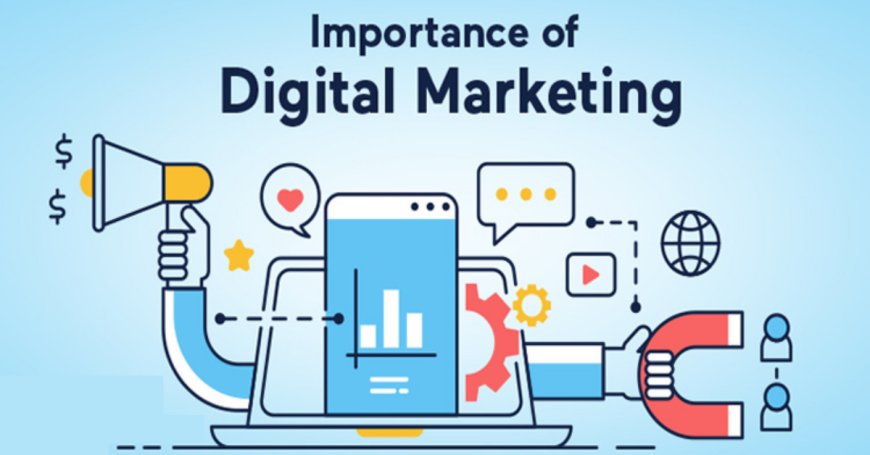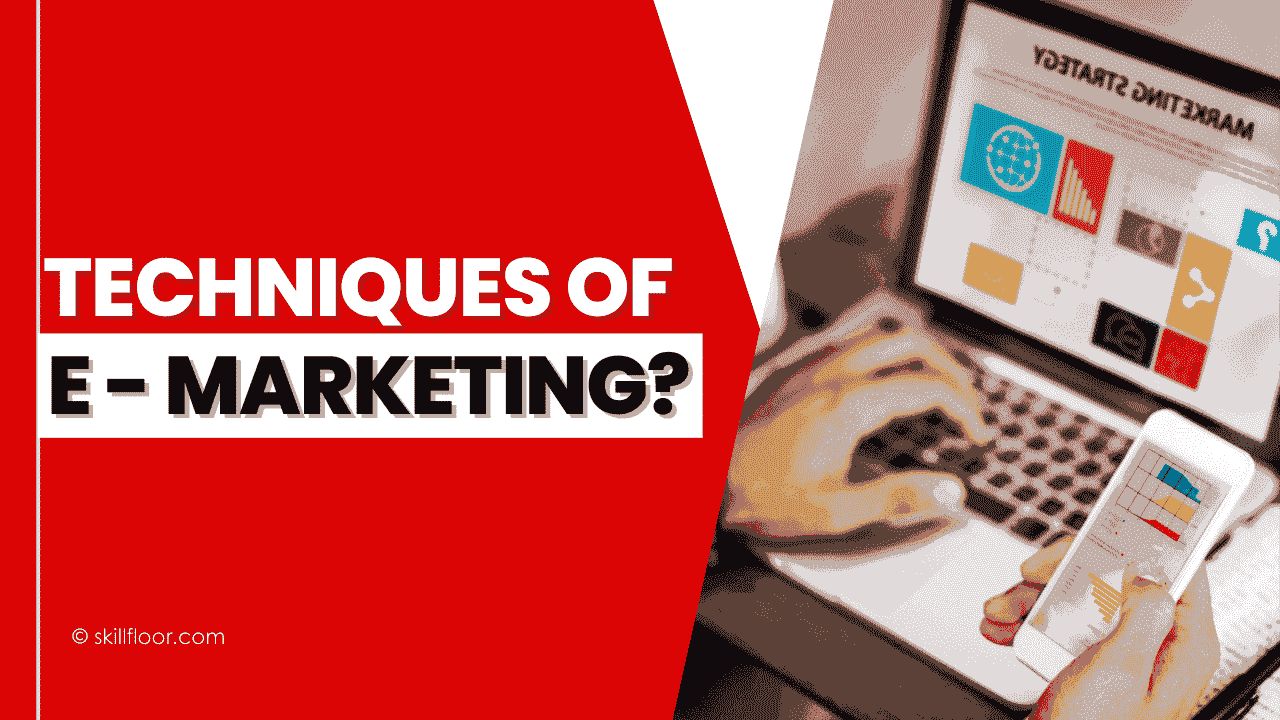What is the Importance of Digital Marketing for Business
Explore the pivotal role of digital marketing in business growth. Learn why leveraging online strategies is crucial for reaching and engaging a broader audience, increasing brand visibility, and driving sustainable success.

The necessity of digital marketing has become critical to the success of businesses worldwide in our quickly changing digital age. Businesses must change and accept the digital sphere as the ever-growing internet world eclipses old marketing strategies. Digital marketing is more than just a fad; it's a strategic necessity for engaging with modern consumers, building brand awareness, and propelling company expansion. In the changing field of business, comprehending the importance of digital marketing is essential to remain current and competitive in this era of digitalization, where every swipe, click, and share counts. Let's explore the many reasons why digital marketing has evolved into a vital tool for companies looking to succeed in the markets of today.
How to Adjust to Digital Trends for Expanding Businesses
The explosive growth of technology in modern businesses necessitates a change in marketing tactics. Even if old approaches are still somewhat relevant, they can't keep up with the demands of the modern digital world. Companies use digital marketing to be competitive because they understand how important it is to reach their target audience. Because the internet environment is changing, maintaining relevance and successfully reaching and interacting with clients requires a proactive approach.
Digital Marketing Is Essential for Businesses
Businesses that just use conventional marketing methods confront difficulties as the internet and online platforms grow more and more integrated into customer behavior. Users of today choose, investigate, and make purchases in new ways, which could result in the unrealized potential of a sizable client base. To stay competitive in today's market, firms need to adopt digital marketing to keep up with these changes and effectively interact with their changing audience.
Why is digital marketing essential for businesses in the contemporary scenery?
Digital marketing holds immense importance for several reasons, all of which contribute to a company's success in the digital age.
1. Global Reach
Digital marketing breaks down geographical barriers, allowing businesses to reach a global audience. Through online campaigns, social media, and search engine optimization, companies can connect with customers worldwide, expanding their market reach beyond traditional limitations.
2. Cost-Effective
Compared to traditional advertising methods, digital marketing tends to be more cost-effective. Small and medium-sized businesses can leverage various digital channels without burning a hole in their budgets. This democratization of marketing resources enables even startups to compete on a larger scale.
3. Targeted Advertising
One of the significant advantages of digital marketing is the ability to target specific demographics. Through data analytics and user behavior tracking, businesses can tailor their marketing efforts to reach the right audience. This ensures that promotional content is seen by those who are most likely to convert into customers.
4. Measurable Results
Unlike traditional marketing, digital marketing provides robust analytics and insights. Companies can measure the success of their campaigns in real-time, allowing for adjustments and improvements on the fly. This data-driven approach enhances decision-making and helps in optimizing marketing strategies for better results.
5. Engagement and Interactivity
Digital marketing fosters engagement and interactivity with the audience. Social media platforms, blogs, and interactive content allow businesses to build relationships with customers. This two-way communication is invaluable for creating brand loyalty and understanding customer preferences.
6. Adaptability to Trends
The digital landscape is dynamic, with trends evolving rapidly. Digital marketing allows businesses to adapt to these changes swiftly. Whether it's a new social media platform, emerging technology, or a shift in consumer behavior, companies can adjust their strategies to stay relevant and competitive.
7. SEO and Online Visibility
A well-executed digital marketing strategy enhances a company's online visibility. Search engine optimization (SEO) ensures that businesses appear prominently in search results, increasing the likelihood of attracting organic traffic. This visibility is crucial for brand awareness and attracting potential customers.
8. Building Brand Reputation
Digital marketing provides a platform for companies to showcase their values, mission, and unique selling propositions. Consistent messaging and positive interactions contribute to building a strong brand reputation. Reputation management tools further enable businesses to monitor and maintain their online image.
The importance of digital marketing cannot be overstated in today's business landscape. It is not just a trend but a necessity for staying competitive, reaching a broader audience, and adapting to the ever-changing digital environment. As businesses continue to navigate the complexities of the online world, a well-crafted digital marketing strategy becomes a cornerstone for success.
Digital marketing strategies

Content Marketing
Content marketing involves creating and sharing valuable, relevant, and consistent content to attract and engage a target audience. This can include blog posts, articles, videos, infographics, and more. The goal is to provide value to the audience, establish authority in the industry, and drive customer engagement. Content marketing also plays a crucial role in SEO, as search engines favor high-quality, relevant content.
Social Media Marketing
Social media platforms offer a powerful avenue for connecting with a target audience. Social media marketing involves creating and sharing content on platforms such as Facebook, Instagram, Twitter, LinkedIn, and others. Businesses can use social media to build brand awareness, engage with customers, and drive traffic to their websites. Paid advertising on social media platforms allows for targeted promotion to specific demographics.
Email Marketing
Email marketing remains a highly effective strategy for nurturing leads and maintaining customer relationships. Businesses can use email campaigns to deliver personalized content, promotions, and updates directly to subscribers. Automated email sequences can be set up to guide leads through the sales funnel, providing timely and relevant information.
Pay-Per-Click (PPC) Advertising
PPC advertising involves placing ads on search engines or other platforms, and advertisers pay a fee each time their ad is clicked. This model allows for precise targeting, budget control, and quick results. Google Ads is a popular PPC platform, but social media platforms also offer robust advertising solutions.
Influencer Marketing
Collaborating with influencers in the industry or niche can amplify a brand's reach and credibility. Influencers have a dedicated following, and their recommendations can carry significant weight. Businesses can partner with influencers to create sponsored content, reviews, or endorsements that resonate with their target audience.
Video Marketing
With the rise of platforms like YouTube and the increasing popularity of video content on social media, video marketing has become a powerful strategy. Businesses can create engaging and informative videos to showcase products, share behind-the-scenes content, or provide tutorials. Video content helps in conveying messages effectively and capturing the audience's attention.
Mobile Marketing
Given the prevalence of smartphones, optimizing marketing strategies for mobile users is crucial. This includes ensuring that websites are mobile-friendly, creating mobile-specific ad campaigns, and leveraging technologies like SMS marketing. Mobile apps also provide an additional channel for direct engagement with users.
Digital marketing is indispensable in today's dynamic business landscape. Its pivotal role in global reach, cost-effectiveness, targeted advertising, measurable results, and adaptability to trends makes it a strategic necessity. Engaging content, impactful social media presence, personalized email campaigns, PPC advertising, influencer collaborations, compelling videos, and mobile optimization form a robust digital marketing arsenal. As businesses navigate the digital era, a well-crafted strategy embracing these elements is not just an option but a fundamental key to success in building brand reputation, reaching a wider audience, and staying competitive. Embrace the digital evolution for sustained growth in the ever-changing market.





























































